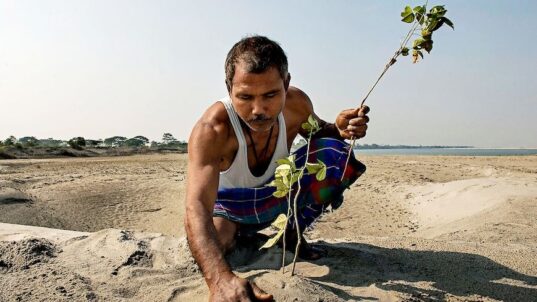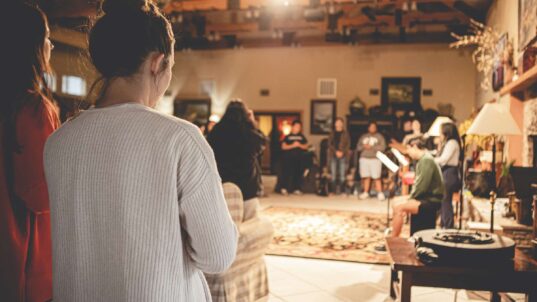As Interactivity Foundation (IF) has learned through actual experience, experts and lay citizens complement each other well in sanctuary discussions. Experts and lay citizens can complement each other in public discussions, as well. This post explains how and why this is so.
In the current policy-making process, the respective roles of experts and lay citizens in public discussion are narrowly typecast. Frequently experts do little more than instruct (or lecture) non-experts about how public policy can or should work, while non-experts do little more than make heard their support for or opposition to policy that has already been formulated by expert decision-makers. Neither the lecture nor the public hearing style of expert-lay “dialogue” involves much in the way of real discussion. By contrast, IF’s discussions benefit from real interactivity between experts and lay citizens.
Complementary Contributions
Experts’ and lay citizens’ contributions to public discussion are at least potentially complementary in the sense that, while overlapping, they are likely to be both different and mutually “correcting.”
Overlapping sources. We are used to thinking of “citizens” and “experts” as categorically different. Experts are authorities, citizens uninformed (or badly informed). Experts know the answers, citizens don’t (and may not even be very aware of the questions). Experts have well-reasoned positions, citizens off-the-cuff opinions (or no opinions at all). And so on. As a result of such stereotypes, we tend to think that only experts have much to contribute to democratic discussion of any type. In part this is because as a society we have narrowed our view of what counts as public discussion to an exchange between authorities. (If democratic discussion is confined to an exchange between authorities, then citizens by definition will be relegated to the passive role of “listener.”) But these categorical distinctions are also the product of a series of artificial dichotomies between citizens and experts—artificial because they conceal significant overlap in the sources of citizens’ and experts’ potential contributions to democratic discussion, public discussion in particular.
Citizens and experts both can usefully contribute to the same public discussion because both:
- have a general knowledge base upon which they can draw in discussion, made up of moral convictions, emotions, memories, and non-technical beliefs about the past, present and future
- are capable of conceptual insights relevant to the exploration, development, selection and exclusion and practical testing of contrasting conceptual possibilities
- have a set of individual preferences, values, and interests
- have a set of social preferences, values, and interests
- must, as individuals and members of various groups and organizations, face the necessity of making choices.
Together, the first two items in this list suggest that “All citizens are experts”—at least in the sense that they have some ability to contribute usefully to the more analytical and conceptual side of governance discussions. Likewise, the last three items in the list suggest that “All experts are citizens” and so have some ability to contribute usefully to the more “public” or “ethical” side of governance discussion.
This overlap may not be widely recognized. But it is offers a practical explanation for citizens’ and experts’ willingness to engage in thoughtful discussion with one another: both groups can learn from one another about matters that concern them both.
Different contributions. Experts are specialists in a particular substantive or analytical field, whether by study, training, professional experiences or, perhaps most typically, by some combination of these. In the best of circumstances (see the next section, below), such “specialists” can make two useful contributions to public discussion:
- technical knowledge (“empirical” and/or “theoretical”)
- logical and analytical ability
We tend to recognize that individual lay citizens can find thoughtful discussion with others personally valuable. Less often appreciated is the degree to which their very status as “generalists” puts lay citizens in a position to make a number of useful contributions to public discussion, including:
- life experience
- creativity
- breadth of view
- relatively dispassionate interest in the public good.
But that is only the half of it. Perhaps the most important thing to remember is that experts and lay citizens will tend not only to contribute different positive things to public discussion, they will also tend to ensure that each other’s contributions are not diminished by being taken to excess.
The very attributes that make experts valuable to public discussion—technical knowledge and analytical skill—can also undermine experts’ usefulness if taken too far. When not appropriately channeled, technical knowledge and analytical skill can undermine a discussion by leading participants to focus on:
- technical problem-solving
- the purely analytical side of contrasting conceptual possibilities to the complete exclusion of moral considerations
- defending or reforming—rather than rethinking—the status quo (due to commitments to particular disciplinary boundaries, conventional ways of thinking, or current institutions)
- advocacy.
If these tendencies are not effectively countered then public discussion of contrasting conceptual possibilities will be frustrated, as experts either content themselves with working out narrow policy “fixes” or become advocates for particular positions that they regard as the “right” or “authoritative” answers. Fortunately, citizens’ contributions—life experience, creativity, breadth, and public spiritedness—will tend to act as a corrective to these tendencies (a tendency that can be further enhanced, as noted further on in this post).
Similarly, the attributes that make citizens’ contributions especially valuable to public discussion—life experience, creativity, breadth, and public spiritedness—can also undermine their usefulness, as when they lead participants to:
- broaden discussion to such an extent that it loses any useful focus
- overlook the social, political, and economic aspects of contrasting conceptual possibilities.
These tendencies tend to be less of a threat to public discussion than those posed by an “excess” of expertise, and can usually be handled by an alert facilitator even when they do arise. But to the extent they do exist, they too are likely to be effectively countered by the complementary contribution of experts, which can be expected to counter citizens’ tendencies to lack focus and rigor.
In this way, expert and lay citizen contributions tend to act as a break or constraint on an excess of the virtues of the other. Each group can in this way protect or safeguard the contributions of the other.
The Need for Caution in Involving Experts in Public Discussion
Public discussion must admit all interested parties to qualify as “democratic” or “public.” And, with some help from the facilitator, even in the absence of any experts, it can produce useful results, particularly if focused on exploration, development, selection and exclusion, and/or practical testing of contrasting conceptual possibilities.
For the reasons just given, experts can improve the likelihood that public discussion will be useful—but only if lay citizens are able to exercise the constraining effect described at the end of the last section. Sometimes they will be able to accomplish this wholly on their own. Sometimes citizens will need the help of the discussion planner and facilitator, who will have to take care to prevent experts from dominating the discussion.
As a general rule, the more the discussion concentrates on contrasting conceptual possibilities, the less the danger that experts will divert discussion into technical arguments or advocacy and the more discussion will be enhanced by the interactive contributions of both citizens and experts. Focusing on contrasting conceptual possibilities in public discussion can help ensure interactive discussion between experts and citizens because in addressing contrasting conceptual possibilities:
- citizens’ conceptual creativity, breadth and moral sensibilities will matter at least as much as experts’ technical knowledge and analytical ability
- citizens will be on relatively equal standing with experts in the exploration, development, selection and exclusion, and/or practical testing of possibilities since possibilities relate to the future, which no one can know with anything approaching real “authority”
- advocacy is ruled out by the very plurality of the possibilities under discussion.
Encouraging Complementarity between Experts and Lay Citizens
Beyond a focus on contrasting conceptual possibilities and active facilitation, it may be possible to encourage complementarity between experts and lay citizens in public discussion by giving citizens some advance time to work together in the absence of experts. This approach has helped lay citizens develop a sense of competency in most or all of IF’s longer sanctuary discussions, which in turn enabled them to work more constructively with experts.
Integrating this feature of sanctuary discussions into public discussion need not contradict the principle of keeping discussions fully open to the public. Lay citizens could, for example, meet in separate preliminary sessions. Or they could meet in separate concurrent sessions before joining experts in a “plenary” discussion. In either case, citizen competency is likely to be enhanced, and the resulting complementarity between experts and lay citizens in public discussion encouraged.
* For an earlier, slightly expanded, version of this post, see essay A-4 at: https://www.interactivityfoundation.org/wp-content/uploads/2009/12/Public-Discussion-paper.pdf



